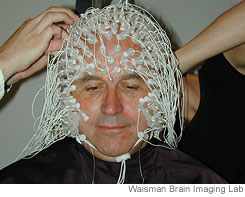 A good friend sent me this WSJ article: How Thinking Can Change the Brain. It makes the point that your brain can be fundamentally altered by your mind, your thoughts, if you will. Rather than the other way around.
A good friend sent me this WSJ article: How Thinking Can Change the Brain. It makes the point that your brain can be fundamentally altered by your mind, your thoughts, if you will. Rather than the other way around. That's nice. But I sent my friend this reply, which is based upon some of my current reading, and it seems to resonate within me:
Ken Wilber has some thoughts on this type of investigation. Good to do, but don’t expect to understand consciousness from it.
In his book “A Brief History of Everything”, Wilber makes a distinction between the surface of things, and their depth. Understanding the brain from this materialistic/empirical examination would be gaining insight into its “surface”. But understanding the mind, and even more so, the spirit that perhaps moves the mind, cannot be seen in this way.
“... he can know what every atom of by brain is doing, and he still won’t know a single thought in my mind. This is really extraordinary. ..."
“... The interior dimension can only be accessed by communication and interpretation, by “dialogue” and “dialogical” approaches, which are not staring at exterior but sharing of interiors. Not objective by intersubjective. Not surfaces but depths.”
“You can point to the brain ... but you cannot simply point to envy, or pride, or consciousness, or value, or intention, or desire. Where is desire? Point to it. You can’t really ... because it’s largely an interior dimension ... This doesn’t mean it isn’t real!”
He goes on to explain how the Enlightenment — for all of its good — placed all of the West’s focus on this materialistic/empirical approach. For example, if someone is depressed, the “lab technician” approach would be to determine a lack of serotonin in the brain, and prescribe some Prozac. Never mind that the depression was caused by a lack of values, a lack of meaning to one’s life, perhaps an existential angst that resulted in the physiological manifestation of a lack of serotonin. And of course, you can take all of the Prozac that you like, and it may make you feel better, but it won’t give you meaning to your life.
I think he is on to something — this integral approach. And as a result, I am now less interested for science to “prove” the unique aspects that come about through meditation. Why not just do it yourself and see? Why not just interact and talk with others that are very experienced in mediation to help guide you and interpret the results. Who cares of I’m generating gamma rays or alpha rays? What meaning is there in any of that?
Just a thought. Thanks for the article. The part I found interesting was this acknowledgment: "This positive state is a skill that can be trained” Had the author said “learned” rather than “trained” I would have been more impressed. He continues to see his “patient/subject” as just one more lab animal to be studied, objectively, empirically, and monologically. Sigh. Maybe he should try talking to them.


